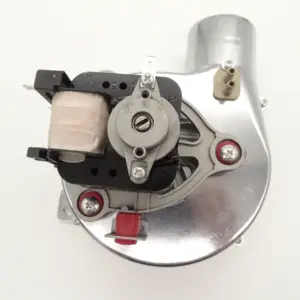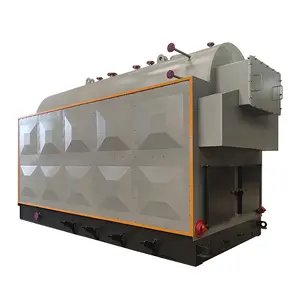

High Pressure Combustion Blower Fan For Gas Heater Pellet Burner Biogas Fireplace Stove Boiler Oven Furnace AC 110/230 Clockwise


Aluminum Die Casting CNC Machining Blower Burner Fan For Gas Heater Pellet Burner Stove Boiler Oven Furnace
























A pellet boiler is an advanced heating system that harnesses the energy from the combustion of compacted biomass pellets to produce heat for a range of uses. These systems are engineered to offer a renewable and efficient source of warmth, using materials like wood pellets, agricultural residues, or other biomass products. The wood pellet boiler is especially noted for its environmental benefits and cost savings, presenting an attractive alternative to conventional fossil fuel sources.
A wide array of pellet boilers is available on Alibaba.com, each tailored to fulfill distinct requirements. The selection spans from wood pellet furnaces ideal for domestic settings to expansive biomass wood burners for commercial applications. Some models are crafted for indoor placement, whereas outdoor pellet furnaces are constructed to endure harsh weather conditions. The wood chip boiler represents an alternative that utilizes wood chips rather than pellets, suitable for those with access to such biomass. Each variant exhibits unique features, like the pellet burner for boiler which is designed for seamless integration into existing systems, or the windhager pellet systems, which boast sophisticated European design.
The architecture of a pellet boiler is central to its functionality. At its core is the combustion chamber, where the wood pellet biomass boiler ignites the pellets. The resultant heat is conveyed to water within the heat exchanger, producing steam or hot water for space heating. The apparatus includes an exhaust for expelling combustion gases, a control unit for managing temperature and operations, and safety mechanisms to avert overheating or back-burning. The pellet heating system may also incorporate a buffer tank to retain surplus heat, guaranteeing a consistent output and optimized energy consumption.
The material selection for a pellet boiler is pivotal to its efficacy and durability. Premium stainless steel is commonly employed in the heat exchanger for its anti-corrosive properties and superior heat conduction. The combustion chamber might be lined with ceramic or alumina to withstand high temperatures, while cast aluminum is utilized for parts that demand both robustness and a lighter weight. Storage hoppers are typically fashioned from cold rolled steel, valued for its strength and capacity to bear the pellet load.
Pellet boilers have carved a niche in various commercial environments. Within the manufacturing realm, they deliver consistent thermal energy for both processes and facility heating. In the agricultural sector, they are instrumental in warming spaces like greenhouses, thus promoting plant development. The hospitality industry, encompassing hotels and eateries, relies on these boilers for central heating and hot water provision. The adaptability of pellet boilers to diverse contexts, from office buildings to residential complexes, and even as cooking fuel, underscores their versatility in enhancing business operations and efficiency.
The principal role of a pellet boiler is to supply heat. They adeptly warm substantial volumes of water for ambient heating and domestic hot water needs. Cutting-edge models can be assimilated with pre-existing heating infrastructures, such as underfloor systems or radiators. Certain boilers are equipped with intelligent technology, enabling them to modulate combustion efficiency in response to thermal demand, marking a significant stride towards automated heating solutions.
Pellet boilers are distinguished by attributes such as automated pellet feeding mechanisms and self-cleaning features that diminish the need for manual upkeep. The remote control functionality permits users to modify settings remotely, enhancing convenience. Energy efficiency is a prominent advantage, with numerous models achieving high efficiency ratings and the capacity to transform a substantial portion of biomass fuel into heat, thereby minimizing waste and operational expenses.
Employing a pellet boiler yields a multitude of advantages. They offer a greener alternative to fossil fuel systems, cutting carbon emissions and aiding businesses in reaching sustainability targets. From an economic standpoint, they can lead to considerable energy bill reductions due to their high efficiency. The utilization of biomass pellets, a sustainable resource, further contributes to energy autonomy and security, lessening dependence on the unpredictable fossil fuel market.
Effective operation of a pellet boiler necessitates a grasp of the control system, which typically encompasses settings for temperature, feed rate, and operational modes. Adherence to the manufacturer's instructions for startup and shutdown protocols is crucial for safety and the system's longevity. Consistent monitoring of the pellet supply in the hopper is vital to maintain uninterrupted functioning.
Selecting the appropriate pellet boiler requires evaluating heating demands, spatial constraints, and financial considerations. It is essential to choose a size that aligns with the property's heating needs to ensure efficient performance. The caliber of components, such as the motor and gearbox, should also be taken into account, as they influence the boiler's operation and maintenance frequency.
Regular cleaning and maintenance are imperative for the smooth operation of a pellet boiler. This involves routine ash disposal from the combustion chamber, inspecting seals and gaskets for integrity, and checking the auger and hopper for potential obstructions. An annual professional check-up is advised to confirm the boiler's optimal efficiency.
The installation of a pellet boiler should be executed by accredited technicians. The process entails linking the boiler to the heating network, electrical grid, and the chimney or flue system. Proper pipe insulation and compliance with local construction regulations and standards are imperative for the system's safe and effective operation.
After-sales services for pellet boilers may encompass complimentary spare parts, return and replacement policies, on-site setup, training, and inspections. Certain suppliers on Alibaba.com extend comprehensive support, including video technical assistance, online help, and field maintenance and repair services.
Indeed, pellet boilers are a cost-effective heating solution. They utilize economical and renewable fuel sources, incur lower running costs compared to traditional heating systems, and are engineered for high efficiency and energy savings. The initial outlay is typically recouped through sustained fuel cost savings over time.
A wood pellet furnace boiler contributes to environmental sustainability by utilizing biomass, a carbon-neutral resource. The combustion process emits only as much carbon dioxide as the biomass absorbed during its growth cycle, thus markedly reducing the carbon footprint relative to fossil fuels. Moreover, these boilers are eco-friendly, often boasting emissions that comply with stringent global environmental norms.